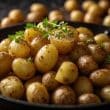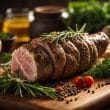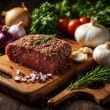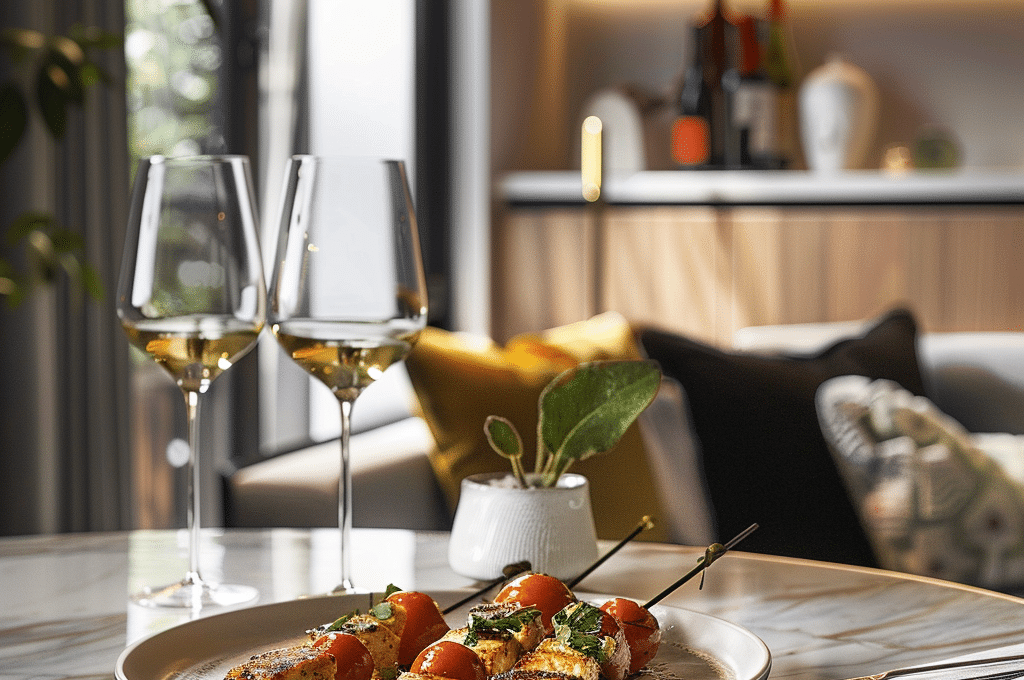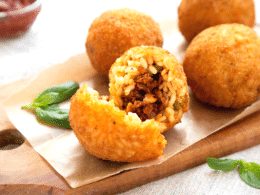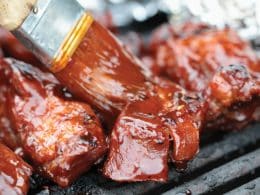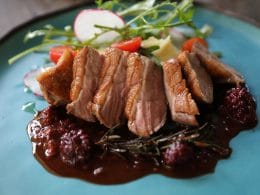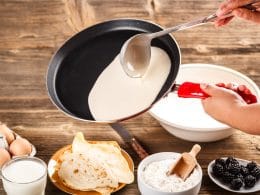Chicken and halloumi skewers combine the succulent flavors of marinated chicken with the firm, slightly salty taste of halloumi cheese. They are an absolute delight whether cooked on an outdoor grill or a stovetop griddle. The charm of these skewers lies in their simplicity; a few high-quality ingredients can create a meal that appeals to a wide range of tastes and dietary preferences.
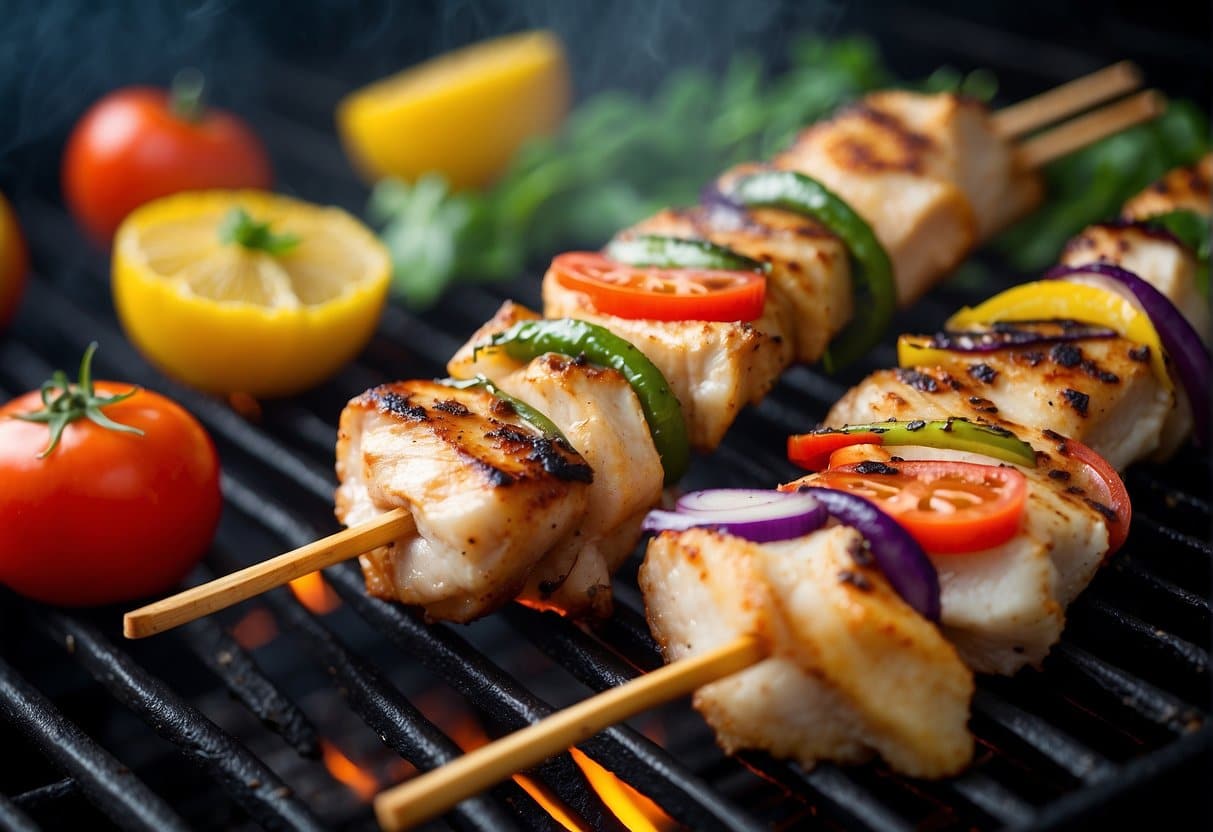
I appreciate the versatility of chicken and halloumi skewers – they can serve as a quick midweek meal or be the centerpiece of a more elaborate weekend barbecue. Skewering the chicken and cheese with vegetables like bell peppers adds both color and texture, creating a balanced and satisfying dish. Plus, their easy-to-handle nature makes them a hit for gatherings and family dinners alike, promoting a casual, interactive eating experience that everyone can enjoy.
Key Takeaways
- Chicken and halloumi skewers are a versatile dish perfect for grilling.
- Selecting quality ingredients and preparing them properly enhances flavor.
- They cater to various diets and are suitable for both casual and formal settings.
Nutritional Profile
In preparing chicken and halloumi skewers, I am mindful of the nutritional content that this dish provides. Primarily, it’s a rich source of protein, thanks to the key ingredients of chicken and halloumi. Olive oil, which is often used in marinating, contributes healthy fats, and when paired with a salad, it enhances the meal’s vitamin and mineral intake. Now, let’s break down the specifics:
Protein Content
The chicken breast is a high-quality protein source that’s essential for muscle repair and growth. A standard serving of chicken breast on the skewers could provide roughly 20-30 grams of protein, which constitutes a significant portion of the daily recommended intake. Meanwhile, halloumi cheese adds a deliciously different texture and also contributes additional protein, although it’s generally lower in protein content compared to chicken.
Cheese Benefits
Halloumi is a semi-hard, brined cheese that not only adds a unique flavor to the skewers but also provides nutritional benefits. It’s particularly rich in calcium, necessary for strong bones and teeth, and it contains phosphorus, which works with calcium to enhance bone health. Moreover, when I use olive oil to cook these skewers, it doesn’t just prevent sticking; it also introduces heart-healthy monounsaturated fats to the meal.
Choosing Ingredients
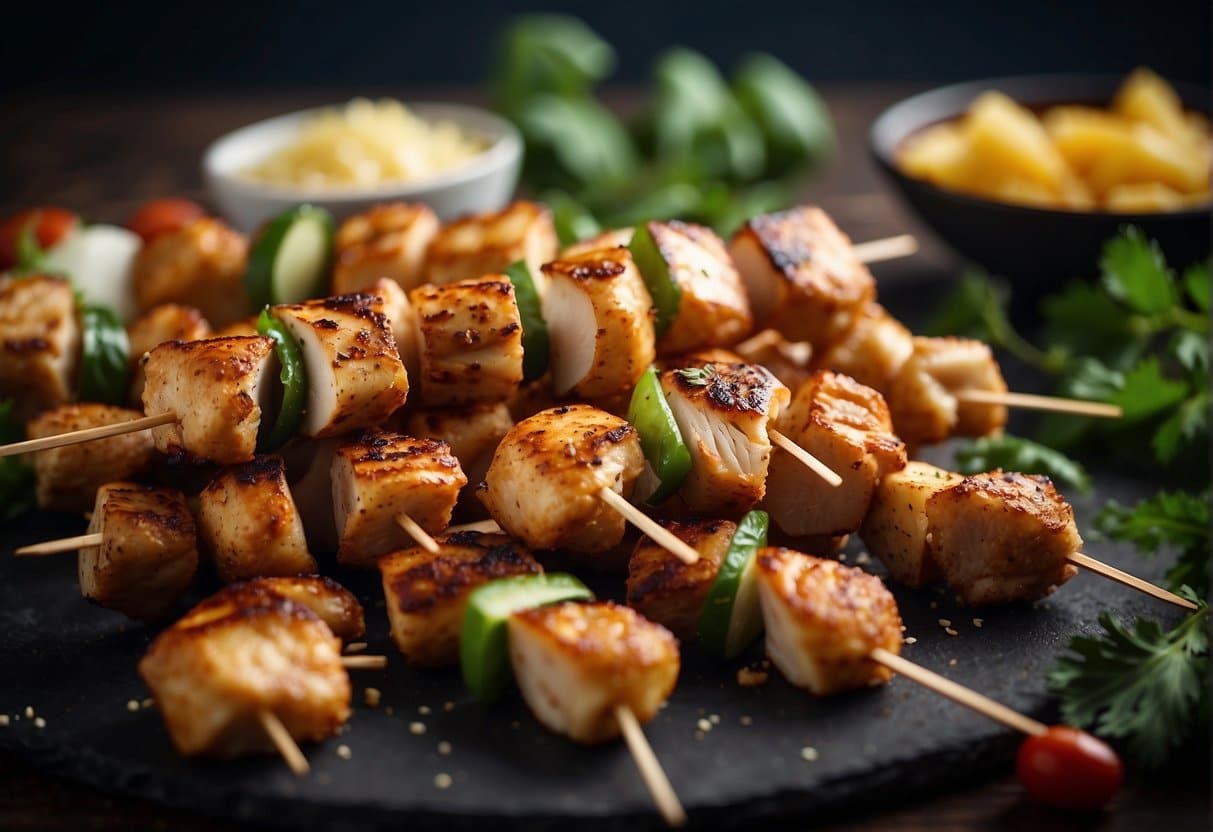
When I prepare chicken and halloumi skewers, I ensure that each ingredient is selected with care to create a dish that’s both flavorful and visually appealing.
Selecting Chicken
Type: I opt for boneless, skinless chicken breasts because they are lean, tender, and easy to cut into uniform cubes, which ensures even cooking. It’s important for the chicken to be fresh and of high quality for the best taste and texture.
Halloumi Selection
Quality: My choice of halloumi is always a firm, grilling cheese that can withstand the heat without melting away. The ideal halloumi should have a recent production date to guarantee freshness, as halloumi tends to get saltier and harder as it ages.
Vegetables and Extras
Oils and Seasonings:
- Olive oil: I look for extra virgin olive oil as it provides a robust flavor and holds up well under heat.
- Lemon: Fresh lemons are necessary for their zest and juice, which will add brightness to the marinade.
- Garlic: Fresh garlic cloves, minced, will infuse a pungent and spicy undertone.
Vegetables:
- Peppers: I include red peppers for their sweet flavor and vibrant color.
- Cherry Tomatoes: Cherry tomatoes add juiciness and a burst of color.
- Other Veggies: I sometimes vary the skewers with eggplant, zucchini, or mushrooms for their complementary flavors and textures.
This combination of ingredients ensures my chicken and halloumi skewers are not only delicious but also a feast for the eyes.
Preparation Techniques
When preparing chicken and halloumi skewers, precision in cutting and robust marinating contribute significantly to the flavors and textures of your dish. My technique ensures that everything cooks evenly and absorbs the marinade for maximum taste.
Cutting and Skewering
With a sharp knife, I cut the chicken breast into uniform 3cm pieces to ensure even cooking. The halloumi cheese should be cut into similar sizes to prevent it from both overpowering the chicken and cooking unevenly. I then take wooden skewers that have been soaked in water for at least 30 minutes to prevent burning, or opt for sturdy metal skewers, and carefully thread the chicken and halloumi alternately with any vegetables I might be using.
- Cutting Chicken and Halloumi:
- Chicken: 3cm cubes
- Halloumi: 3cm cubes
- Skewering:
- Alternate chicken and halloumi on skewers
Marinating Chicken
To make the marinade, I mix olive oil, fresh lemon juice, crushed garlic, and freshly chopped oregano with a pinch of salt to taste. Marinating the chicken for at least 30 minutes refrigerated allows the flavors to infuse and tenderize the meat, elevating the skewers from simple to spectacular.
- Marinade Ingredients:
- Olive oil: 60ml
- Lemon juice: From 1 lemon
- Garlic: 1 clove, crushed
- Fresh Oregano: 2 tablespoons, chopped
- Salt: 1/2 teaspoon
I ensure the chicken is well-coated and often turn the pieces mid-way through marinating to cover all sides evenly.
Cooking Method
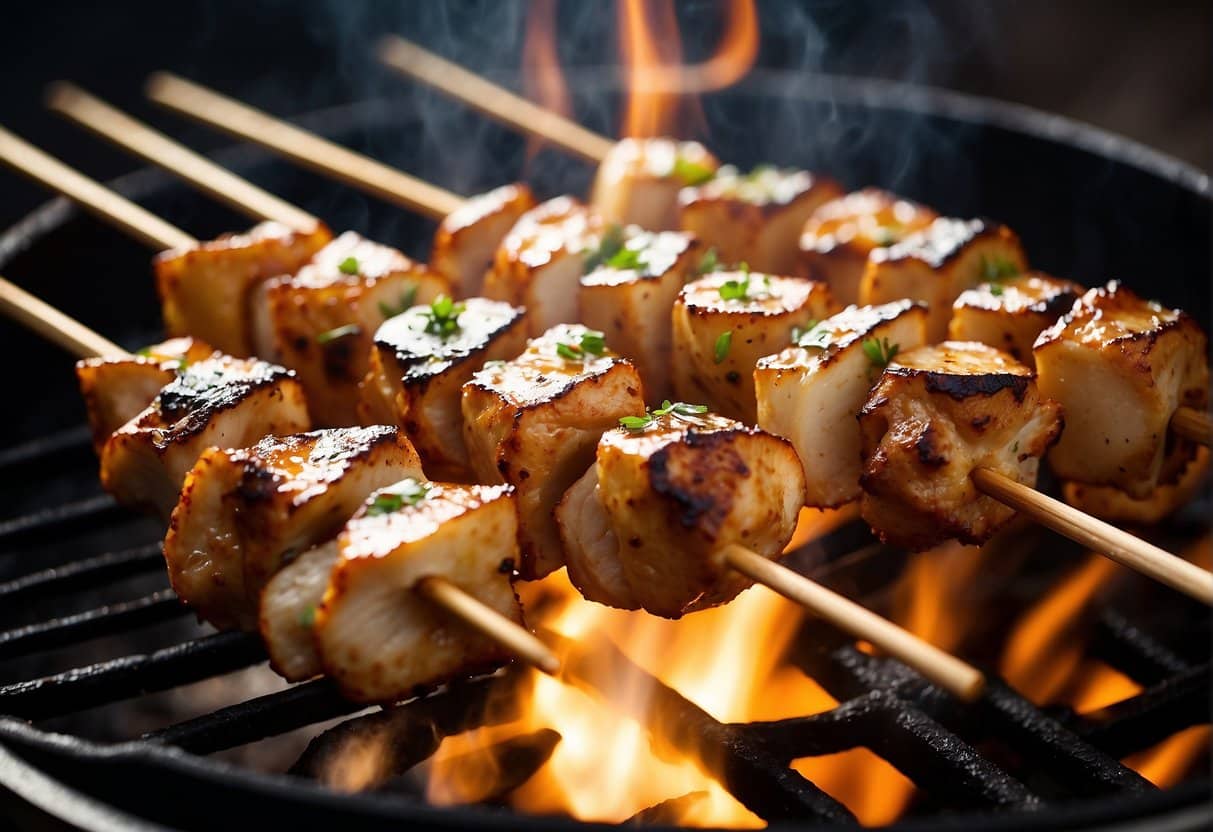
Before diving into the specifics, it’s important to note that preparing chicken and halloumi skewers involves a preheated grill to ensure consistent cooking and to avoid any burns. Olive oil plays a crucial role in preventing sticking and adding flavor, while attention to the grill’s heat is key to achieving the perfect texture for both the halloumi and chicken.
Grill Setup
To start, I ensure my grill is clean to prevent any stickiness that could lead to the skewers burning. I preheat my grill to a medium-high heat, which is typically around 375°F to 400°F. This temperature allows the chicken and halloumi to cook evenly without burning. It’s essential to give the grill a good 10-15 minutes to reach the desired temperature before placing any skewers on the grates.
Grilling Skewers
I thread my chicken and halloumi onto the skewers in alternate pieces, which allows each element to absorb the smoky BBQ flavors equally. I lightly brush the skewers with olive oil to enhance browning and prevent sticking. Laying the skewers on the grill, I cook them for roughly 10 minutes, turning occasionally for an even grill mark and to ensure the chicken is cooked through without burning the halloumi. The goal is to achieve a golden-brown texture on the cheese and a thoroughly cooked, juicy interior for the chicken. During grilling, watching the skewers closely prevents any over-charred edges and ensures a delectable outcome.
Seasoning and Flavors
When I prepare chicken and halloumi skewers, I focus on creating a balance of robust seasonings and aromatic flavors to enhance the natural tastes of the ingredients. Selecting the right combination ensures every bite is savory, zesty, and memorable.
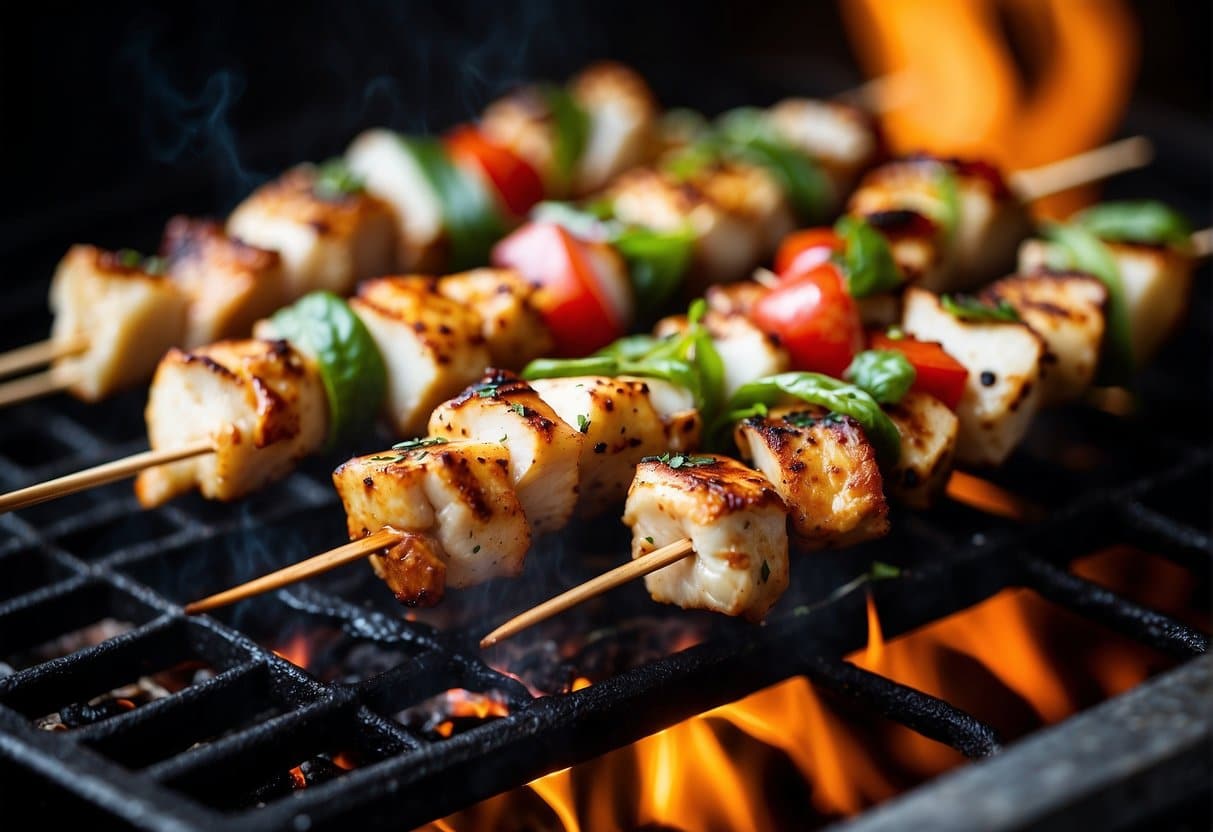
Herbs and Spices
For the herbs and spices, I start with a base of paprika and oregano, which provide a warm, earthy backdrop. To this, a touch of smoked paprika adds depth, while chilli powder brings a gentle heat. I love using fresh herbs like mint to brighten the mixture. The freshness of mint complements the natural saltiness of halloumi beautifully. My go-to proportions for the spice mix are as follows:
- Paprika: 1 tsp
- Smoked Paprika: 1/2 tsp
- Chilli Powder: 1/4 tsp
- Oregano: 1 tbsp (fresh or dried)
- Mint: 2 tbsp (chopped)
Acid and Oils
The right acid and oils can transform skewers from good to great. I often use the zest and juice of one lemon, which contributes a fresh, acidic quality that cuts through the richness of the cheese and meat. For the oil, olive oil is my top choice due to its fruity notes, but avocado oil is a fantastic alternative, especially for its higher smoke point, which is perfect for grilling. Here is the combination I swear by:
- Lemon Juice: 2 tbsp
- Lemon Zest: 1 tsp
- Olive Oil: 1/4 cup
I always make sure to whisk these liquids well before coating the skewers to ensure each piece is enveloped in flavor. The salt in the halloumi and the acidity from the lemon create a harmonious fusion that makes these skewers a hit at any gathering.
Serving Suggestions
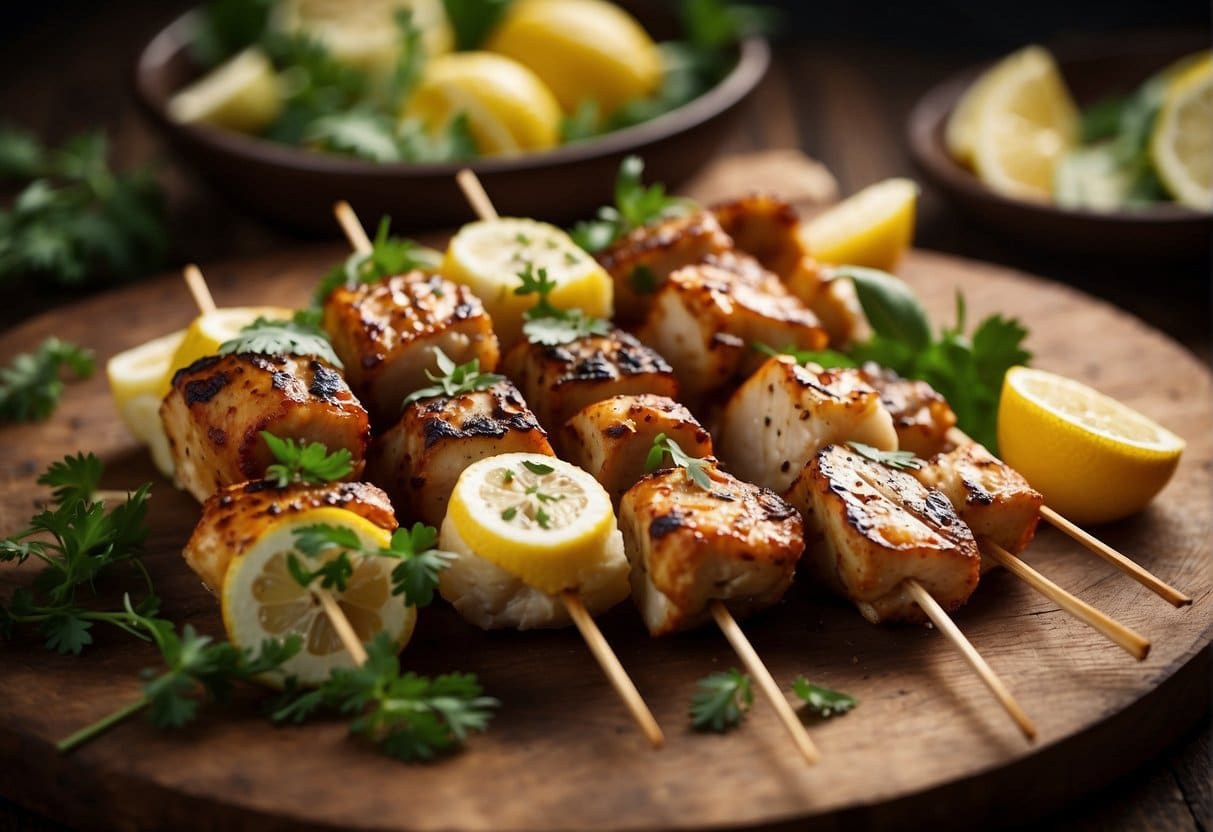
When I prepare chicken and halloumi skewers, I find that they pair beautifully with an array of sides and are versatile enough to accommodate different protein preferences as well.
Accompaniments
- Salads: A fresh salad with crisp greens and a zesty lemon vinaigrette complements the skewers’ smoky flavor.
- Grains: Serving these skewers over fragrant herbed pasta or alongside a warm quinoa salad can make for a filling meal.
- Vegetables: Corn on the cob with a dab of butter and a sprinkle of salt is a classic side that matches well with the skewers’ charred taste.
Alternative Proteins
- Fish: If I’m serving guests who prefer fish, I replace chicken with salmon or shrimp, which I’ve found grill equally well with halloumi.
- Tofu: For a vegetarian twist, firm tofu is an excellent substitute for chicken; it absorbs flavors well and adds a different texture to the mix.
Dietary Considerations
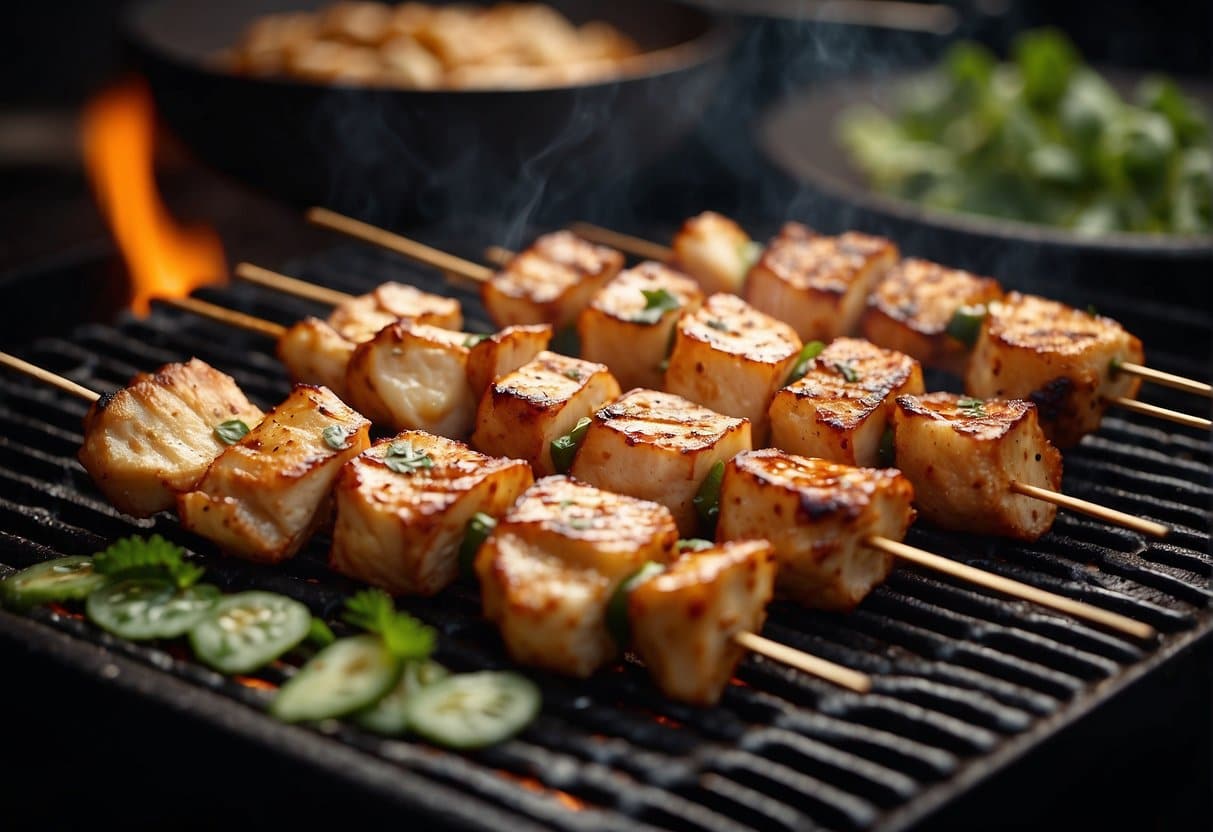
In my experience, tailoring chicken and halloumi skewers to adhere to specific dietary needs can be quite straightforward. Whether you’re looking for low-carb options or vegetarian variations, adjustments can be made to accommodate these preferences without sacrificing flavor.
Low-Carb Options
For those of us following a low-carb diet, chicken and halloumi skewers can be a great meal choice with a few mindful substitutions. I recommend opting for halloumi as your choice of cheese, as it’s inherently low in carbs and holds up well when grilled. To create a balanced meal, I often pair my skewers with a fresh salad dressed in a simple mixture of olive oil, lemon juice, and herbs. It’s a light, yet satisfying side that complements the skewers. To further reduce carbs, I sometimes replace traditional veggies with low-carb alternatives like courgette, which can be cut into ribbons or chunks and thread onto skewers alongside the chicken and cheese.
Vegetarian Variations
If you’re catering to a vegetarian diet, grilling cheese like halloumi stands as a robust centerpiece, ensuring that the skewers remain hearty and delicious. In my recipes, I tend to use chunks of halloumi paired with a colorful array of veggies. A combination of bell peppers, red onions, cherry tomatoes, and courgette creates a vibrant and flavorful skewer. To enhance the dish, I suggest a drizzle of olive oil and a sprinkle of your favorite herbs. Remember, halloumi can be salty, so you might want to balance it with other less salty veggies in your vegetarian skewers.
Tips and Tricks
In my experience, the success of preparing chicken and halloumi skewers lies in mastering the grilling process and understanding the behavior of halloumi cheese when exposed to heat. I’ll share specific methods to prevent overcooking and make the most of your grill time.
Preventing Cheese from Burning
Halloumi cheese is unique; it holds its shape well when heated, but it can also burn if not managed properly. Here’s how I prevent it from burning:
- Preheat the Grill: Always start by preheating your grill to a consistent medium heat. This avoids the sudden shock of high heat that can scorch halloumi.
- Wooden Skewers: If using wooden skewers, soak them in water for at least 20-30 minutes beforehand; this minimizes the chances of them catching fire.
Optimizing Grill Time
To optimize the grill time for your chicken and halloumi skewers, follow these steps:
- Marinade: Marinating your chicken is not just about flavor; it can also reduce cooking time. A good marinade with some acidity helps tenderize the meat, allowing for quicker and more even cooking on the grill.
- Monitoring Grill Time: I grill the skewers for about 10 minutes on each side. Keep an eye on them, turning occasionally to ensure they cook evenly without drying out.
By paying attention to these techniques, I’ve found my skewers to be flavorful, with perfectly cooked chicken and halloumi that has a deliciously golden exterior and a soft, melt-in-your-mouth interior.
Storage and Leftovers
When storing chicken and halloumi skewers, I ensure they’re kept in airtight containers to maintain freshness and prevent any unwanted odors in the fridge. It’s crucial to handle leftovers with care to enjoy these skewers safely later.
Refrigeration
For refrigeration, I immediately place any leftover skewers in the fridge within two hours of cooking to prevent bacterial growth. I use shallow airtight containers to store them, which helps cool the skewers quickly and evenly. Typically, these skewers will last in the fridge for up to three or four days. Here’s a simple breakdown:
- Chicken and Halloumi Skewers: 3-4 days in the fridge.
- Storage Method: Airtight containers, shallow for quick cooling.
Reheating Tips
When it comes to reheating, I prefer using the grill or microwave for the best results. If I’m using a grill, I reheat the skewers on medium heat until they’re hot all the way through, which usually takes a few minutes. In a microwave, I cover the skewers with a microwave-safe lid or paper towel to avoid any splatters and reheat them at medium power. Here’s a quick guide:
- Grill: Reheat on medium heat for a few minutes until thoroughly hot.
- Microwave: Medium power, covered, for 1-2 minutes, checking halfway through.
Keep in mind that halloumi cheese is best enjoyed warm, as it maintains its uniquely chewy texture. Ensuring that both the chicken and halloumi are heated evenly will allow for a pleasant leftover experience.
Frequently Asked Questions
In this section, I’ll address some common questions about preparing and cooking chicken and halloumi skewers, ensuring that your grilling experience is seamless and enjoyable.
What is the best way to prevent halloumi from breaking when skewering?
To prevent halloumi from breaking when skewering, make sure to cut the cheese into sizable chunks and carefully insert the skewer through the larger surfaces. It also helps to keep the halloumi cold, as it becomes more firm and less likely to crumble.
Can you cook chicken and halloumi skewers in an air fryer?
Yes, chicken and halloumi skewers can be cooked in an air fryer. Preheat the air fryer to around 180°C (350°F) and cook the skewers for about 12-15 minutes, flipping halfway through, until the chicken is thoroughly cooked and the halloumi has browned edges.
How do you keep halloumi from sticking to the grill?
To keep halloumi from sticking to the grill, ensure the grill is well-oiled and preheated. You can also brush the halloumi with oil before grilling, which provides an extra layer of protection against sticking.
What are some recommended sauces to pair with chicken and halloumi skewers?
Some great sauces to pair with chicken and halloumi skewers include a zesty lemon and herb dressing or a refreshing marinade made with lemon zest, garlic, and olive oil. These complement the salty flavor of the halloumi and the savory taste of the chicken.
What temperature and how long should you cook chicken and halloumi skewers in the oven?
For cooking chicken and halloumi skewers in the oven, bake them at 200°C (392°F) for about 20-25 minutes, turning once to ensure even cooking. The chicken should reach an internal temperature of 75°C (165°F) to be safe to eat.
Is it necessary to precook the chicken for skewers or can it be grilled raw?
It is not necessary to precook the chicken for skewers; it can be grilled raw. Just make sure the chicken pieces are not too thick, which allows them to cook through evenly at the same time as the halloumi cheese.


